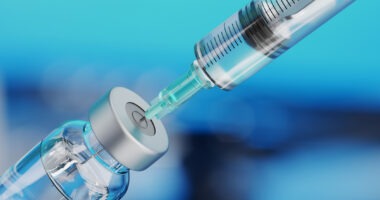New Drug Approvals: Blockbuster Potential
The FDA has approved 42 new molecular entities thus far in 2021. Which products launched or expected to be launched in 2021 have blockbuster potential?
Tracking new drug approvals and blockbuster potential
Thus far in 2021 (as of October 31, 2021), the US Food and Drug Administration’s (FDA) Center for Drug Evaluation and Research had approved 42 new molecular entities (NMEs), which is on par with NME approvals in 2020. In 2020, the FDA approved 53 NME approvals, and as of October 31, 2020, had also approved 42 NMEs, similar to 2021’s tally to date.
Approvals alone do not ensure market success. The key question is how a given drug once launched on the market. An analysis from earlier this year (2021) by Evaluate Vantage using EvaluatePharma data highlights potential blockbusters, which are defined as products with sales of $1 billion or more, which were projected to launch in 2021 and achieve blockbuster status by 2026.
Table I at the end of the article outlines the top 10 blockbuster contenders that are projected to achieve blockbuster status by 2026. Of these 10 potential blockbusters, five are biologics and five are small molecules. The five projected small-molecule blockbusters are: Bristol-Myers Squibb’s mavacamten; Axsome Therapeutics’ AXS-05; ChemoCentryx’s/Vifor Pharma’s avacopan; Aurinia Pharmaceuticals’ voclosporin; and Pfizer’s abrocitinib. The five biologics are Biogen’s and Eisai’s aducanumab; Argenx’s efgartigimod, an antibody fragment; UCB’s bimekizumab; Ascendis Pharma’s TransCon hGH (long-acting human growth hormone); and Bristol Myers Squibb’s/bluebird bio’s idecabtagene vicleucel (ide-cel). Four of the five projected top-selling blockbusters for 2026 are biologics (see Table I at the end of the article). Highlights of some of the leading contenders are outlined below.
Biogen’s and Eisai’s aducanumab. Biogen’s and Eisai’s Aduhelm (aducanumab), a biologic drug to treat Alzheimer’s disease, was slated as one of largest potential blockbusters with $4.8 billion in forecast sales in 2026; however, the approval by the US Food and Drug Administration (FDA) of the drug earlier this year (2021) has raised some concerns. In November (November 2020), an FDA advisory committee voted to reject approval of aducanumab, citing that the drug failed to demonstrate efficacy and more research was needed. FDA advisory committee recommendations are non-binding although they have historically been taken by the full FDA when considering a drug for approval. The companies announced in late January (January 2021) that the FDA extended the review period for the biologics license application (BLA) for aducanumab by three months from March 7, 2021, to June 7, 2021. As part of the ongoing review, Biogen submitted a response to an information request by the FDA, including additional analyses and clinical data, which the FDA considered a major amendment to the application that required additional time for review. Biogen submitted the aducanumab BLA to the FDA in July 2020. The FDA accepted the BLA in August 2020 and granted priority review. It approved the drug in June (June 2021).
Aducanumab is an amyloid beta-targeting antibody that has shown in clinical trials to remove amyloid beta in the brain and slow clinical decline in patients with mild cognitive impairment due to Alzheimer’s disease and mild Alzheimer’s disease dementia. Biogen licensed aducanumab from Neurimmune, a Zurich, Switzerland-based bio/pharmaceutical company. Since 2017, Biogen and Eisai have collaborated on the development and commercialization of aducanumab globally.
Argenx’s efgartigimod. Another biologic slated for blockbuster status by 2026 is efgartigimod, a biologic being developed by Argenx, a Breda, the Netherlands-based bio/pharmaceutical company, for treating generalized myasthenia gravis, a rare muscular disease. The Evaluate Vantage report projects 2026 estimated sales of $2.5 billion. In March (March 2021), the FDA accepted the company’s BLA for the drug. The FDA has set a standard 10-month review process with a target action date of December 17, 2021.
Bristol-Myers Squibb’s mavacamten. Bristol-Myers Squibb’s (BMS’) mavacamten is a small-molecule drug for treating cardiomyopathy and has potential blockbuster status with 2026 estimated sales of $2 billion according to the Evaluate Vantage report. BMS gained mavacamten through its $13.1-billion acquisition of MyoKardia, a Brisbane, California-based bio/pharmaceutical company focused on cardiovascular diseases. In March (March 2021), the FDA accepted the company’s new drug application for mavacamten for treating symptomatic obstructive hypertrophic cardiomyopathy (oHCM). The FDA has assigned a Prescription Drug User Fee Act (PDUFA) goal date of January 28, 2022, so potentially moving product launch to 2022. BMS says it expects to progress mavacamten in additional indications, including non-obstructive HCM.
UCB’s bimekizumab. Another biologic with blockbuster potential is UCB’s bimekizumab, a biologic for treating psoriasis. The Evaluate Vantage report projects 2026 estimated revenues of $1.6 billion. Bimekizumab is an investigational IL-17A and IL-17F inhibitor that is currently under review by the FDA for the treatment of moderate-to-severe plaque psoriasis in adults. The FDA had set a PDUFA review date of October 15, 2021, but last month, UCB reported that the FDA was not able to complete its review because it was unable to complete on-site inspections of the European manufacturing facilities due to COVID-19-related travel restrictions. Therefore, the FDA is deferring action on the application until the inspections can be completed. In August (August 2021), bimekizumab received marketing authorization in countries of the European Union (EU)/European Economic Area (EEA) and Great Britain for the treatment of moderate-to-severe plaque psoriasis in adults who are candidates for systemic therapy. Bimekizumab is not approved by any other regulatory authority outside the EU/EEA and Great Britain. Regulatory reviews are underway in Australia, Canada, Switzerland, and Japan.
Bristol Myers Squibb’s/bluebird bio’s idecabtagene vicleucel (ide-cel). BMS and bluebird bio, a Cambridge, Massachusetts bio/pharmaceutical company, are advancing idecabtagene vicleucel (ide-cel), a B-cell maturation antigen (BCMA)-directed genetically modified autologous chimeric antigen receptor (CAR) T cell immunotherapy, for treating multiple myeloma. The Evaluate Vantage report projects 2026 estimated revenues of $1.5 billion. In March (March 2021), the FDA (through the Center for Biologics Evaluation and Research) approved Abecma (idecabtagene vicleucel) for treating adult patients with relapsed or refractory multiple myeloma after four or more prior lines of therapy, including an immunomodulatory agent, a proteasome inhibitor, and an anti-CD38 monoclonal antibody. In August (August 2021), the European Commission approved Abecma for treating relapsed and refractory multiple myeloma.
Ascendis Pharma’s TransCon hGH (lonapegsomatropin). Ascendis Pharma, headquartered in Hellerup, Denmark, is advancing TransCon hGH (lonapegsomatropin), an investigational long-acting prodrug of somatropin (human growth hormone or hGH) that releases somatropin with the identical amino acid sequence and size as a daily growth hormone. It is designed as a once-weekly treatment for growth hormone deficiency. The Evaluate Vantage report projects 2026 estimated revenues of $1.5 billion. In August (August 2021), the FDA approved Skytrofa (lonapegsomatropin-tcgd) for the treatment of pediatric patients one year and older who weigh at least 11.5 kg and have growth failure due to inadequate secretion of endogenous growth hormone.
The full listing of 10 projected blockbusters, based on 2026 estimated revenues, may be found in Table I below.
| Product; molecule type | Product Type/Indication | Company | 2026 Estimated Worldwide Sales |
| Aducanumab; biologic | Anti-beta amyloid mAb for Alzheimer’s disease | Biogen/Eisai | $4.8 Bn |
| Efgartigimod; biologic | Anti-FcRn mAb for IgG-mediated autoimmune diseases | Argenx | $2.5 Bn |
| Mavacamten; small molecule | Cardiac myosin inhibitor for cardiomyopathy | Bristol-Myers Squibb | $2.0 Bn* |
| Bimekizumab; biologic | Anti IL-17A&F mAb for psoriasis | UCB | $1.6 Bn |
| TransCon hGH (lonapegsomatropin); biologic | Long-acting human growth hormone | Ascendis Pharma | $1.5 Bn |
| Idecabtagene vicleucel (ide-cel); biologic | Anti-BCMA Car-T therapy for myeloma | Bristol Myers Squibb/bluebird bio | $1.5 Bn |
| AXS-05; small molecule* | NMDA receptor antagonist for treating depression | Axsome Therapeutics | $1.2 Bn |
| Avacopan; small molecule | Complement factor C5a inhibitor for vasculitis | ChemoCentryx/Vifor Pharma | $1.2 Bn |
| Voclosporin; small molecule | Calcineurin inhibitor for lupus nephritis | Aurinia Pharmaceuticals | $1.1 Bn |
| Abrocitinib; small molecule | JAK-1 inhibitor for atopic dermatitis | Pfizer | $1.0 Bn |
- Bn is billion; mAb is monoclonal antibody.
- * Forecasts from analysts covering MyoKardia, ahead of BMS buyout. Decision on BMS’ liso-cel (2026 estimated sales of $1.2 billon) could also come in 2021, delayed from 2020.
- Listing excludes COVID-19 products.
- Note: In August 2021, the FDA announced that its review of the new drug application for AXS-05 for the treatment of major depressive disorder would not be completed by the Prescription Drug User Fee Act (PDUFA) target action date of August 22, 2021. The FDA did not request additional information from the company, and the review of the application is ongoing.
- The PDUFA target action date for Bristol-Myers Squibb’s mavacamten was moved to January 28, 2022







